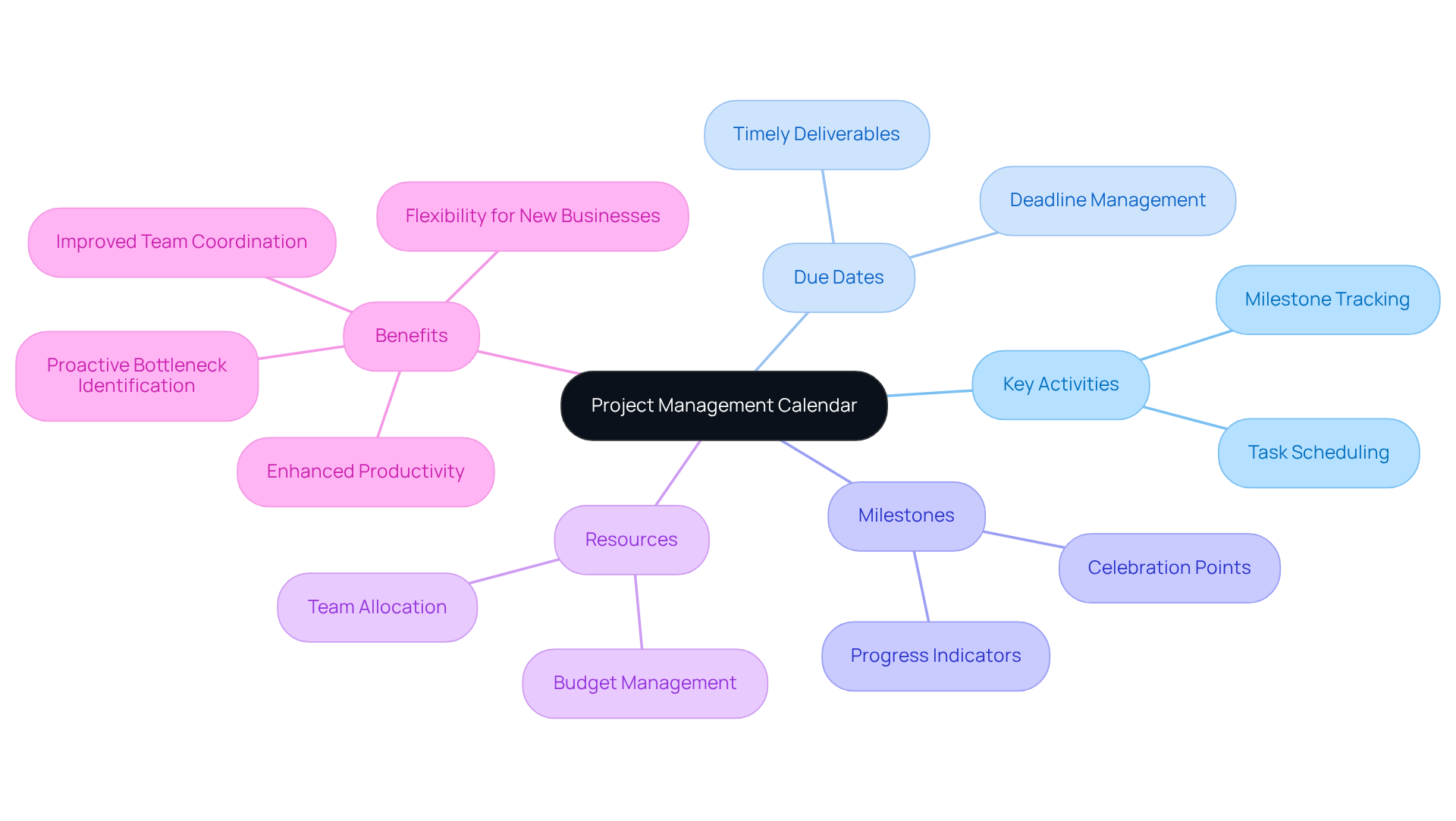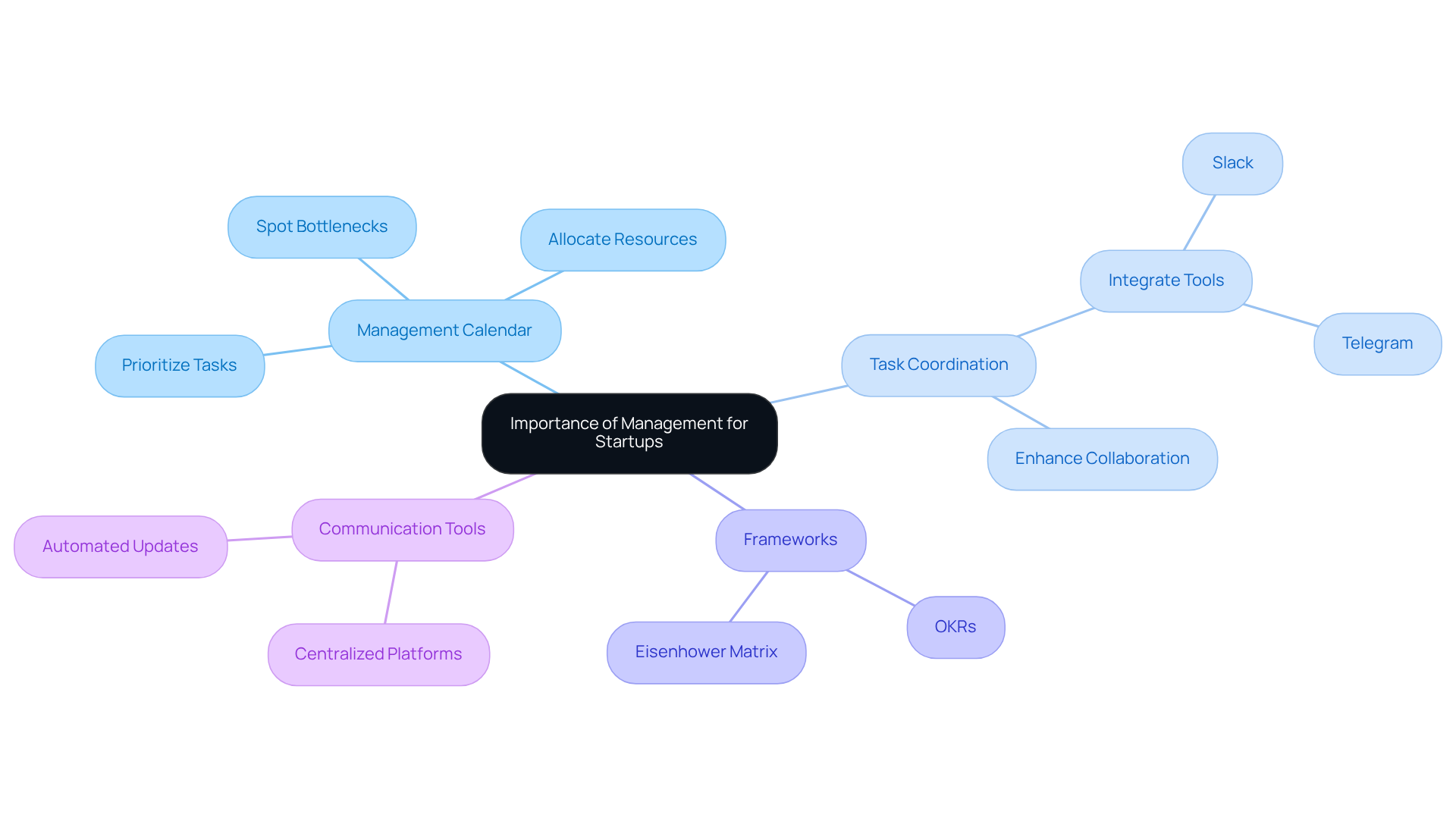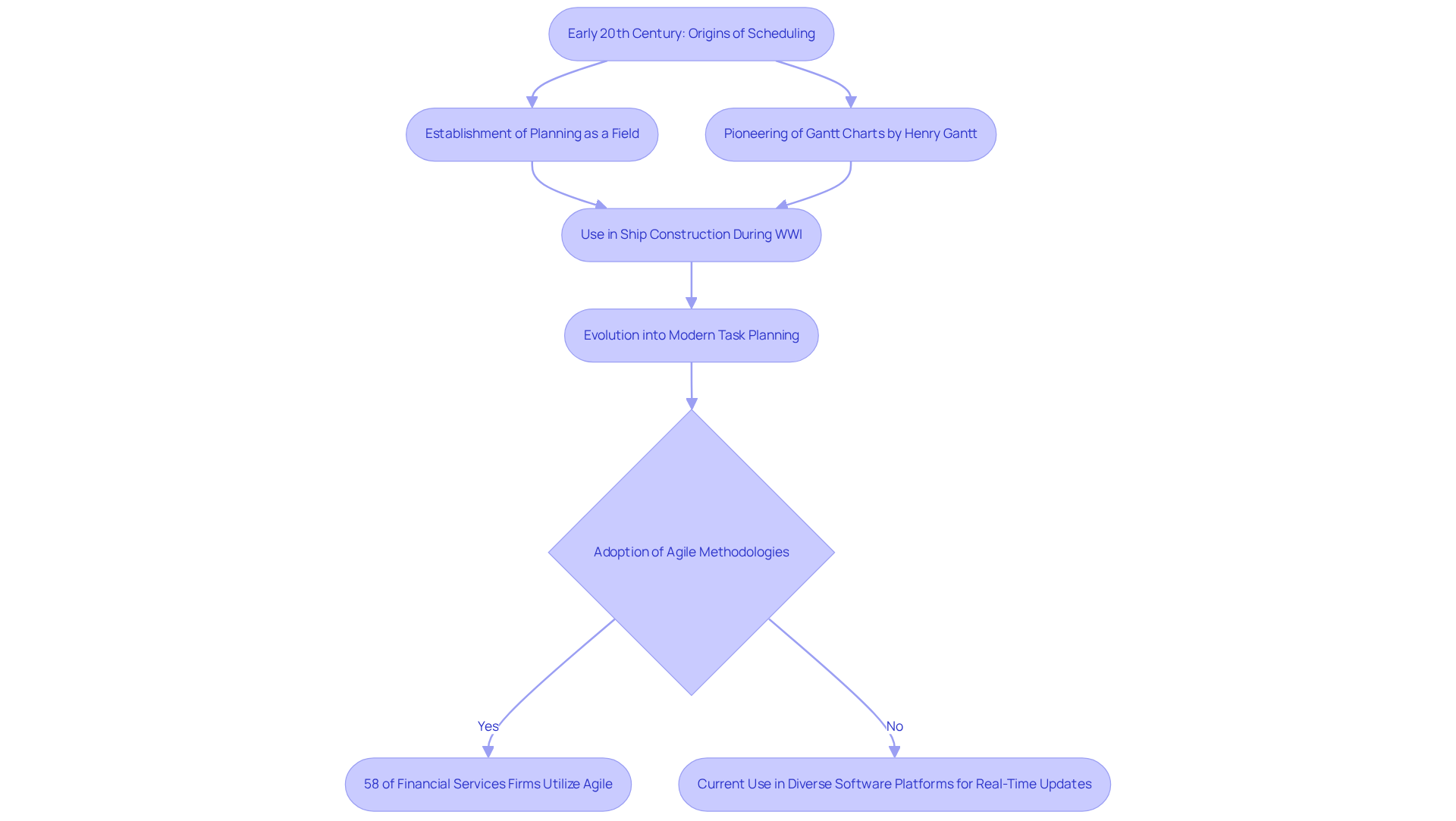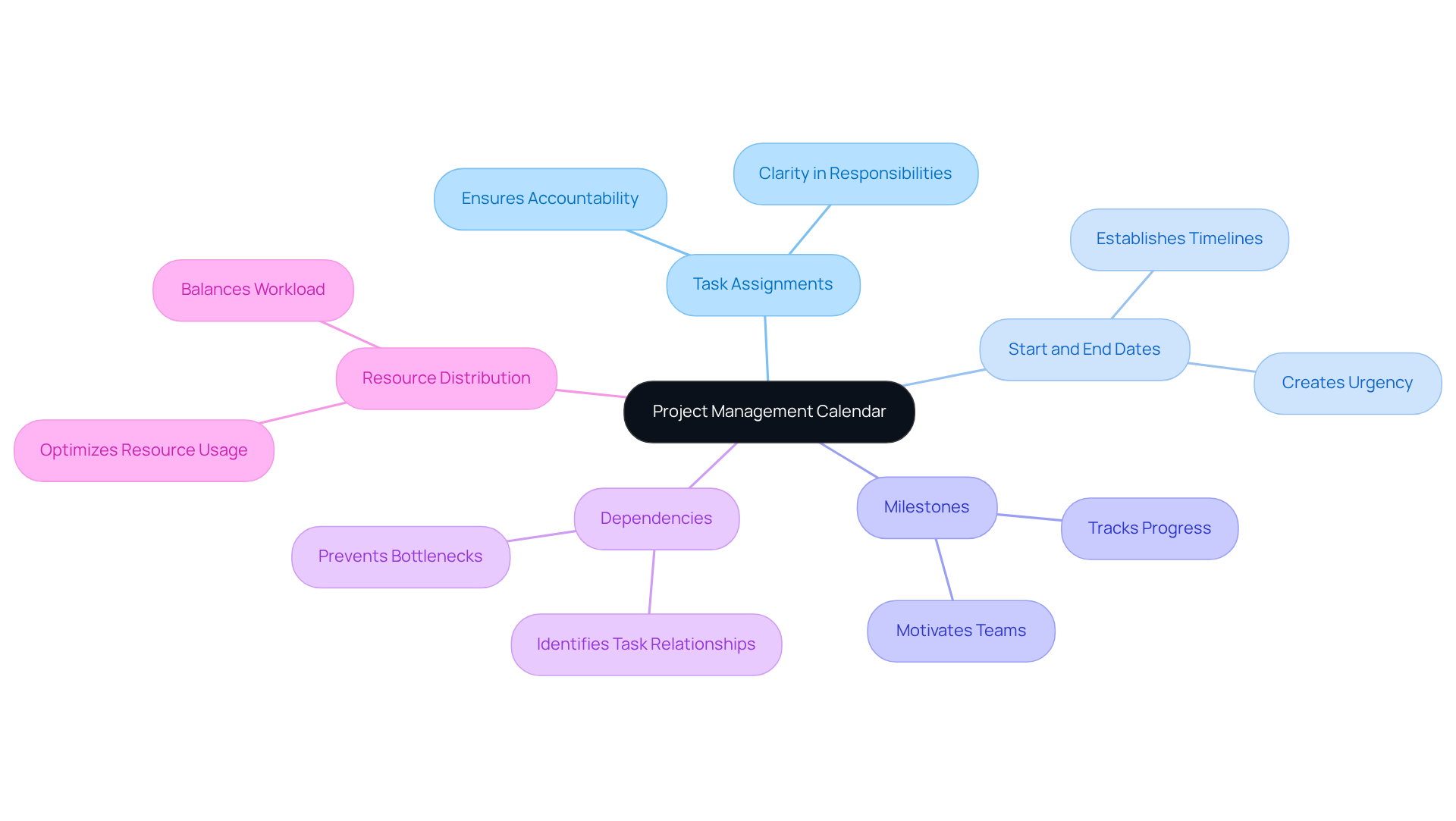Overview
The article highlights the critical importance of a project management calendar for startups. It emphasizes how such a calendar is essential for organizing tasks, tracking progress, and enhancing team coordination. By illustrating the impact of structured timelines and task scheduling, it becomes evident that these elements can lead to increased productivity and higher success rates. Statistics show that effective planning significantly mitigates common project management failures. Are you ready to transform your startup's approach to project management?
Introduction
In the competitive landscape of startups, where every decision can make or break success, a project management calendar emerges as a vital tool for navigating the complexities of new business ventures. This strategic roadmap not only organizes tasks and timelines but also enhances team coordination and accountability. By enabling startups to focus on their objectives with clarity, project management calendars become indispensable.
However, with a staggering percentage of initiatives failing due to poor planning and oversight, how can emerging companies leverage these calendars to turn the tide in their favor? This question is crucial for fostering a culture of productivity and innovation.
Define Project Management Calendar
A project management calendar serves as an essential visual tool that delineates the schedule of an initiative, encompassing key activities, due dates, milestones, and resources. It acts as a strategic roadmap for managers and teams, utilizing the project management calendar to facilitate the coordination of activities, track progress, and ensure alignment among all stakeholders regarding timelines. By offering a clear summary of tasks and their respective timelines, a project management calendar empowers teams to remain organized and focused on their objectives.
Efficient planning schedules, especially when using a project management calendar, are particularly crucial for new businesses, where flexibility and transparency can significantly impact success. For instance, organizations that prioritize planning experience a 46% improvement in outcomes, underscoring the importance of structured timelines. Moreover, new enterprises that utilize task scheduling tools often benefit from enhanced team coordination, as these resources help mitigate common challenges associated with unclear objectives and misunderstandings, which contribute to 37% of failures in their project management calendar.
Case studies reveal that startups employing planning schedules have witnessed notable improvements in team collaboration and productivity. By visualizing stages and deadlines on the project management calendar, teams can identify potential bottlenecks early, allowing for timely adjustments. This proactive approach not only streamlines workflows but also nurtures a culture of accountability and transparency through the use of a project management calendar.
Expert opinions further reinforce the effectiveness of scheduling tools. Many industry leaders advocate for the project management calendar, emphasizing that it enhances team organization and communication—crucial elements for navigating the complexities of new business environments. In fact, 93% of organizations that adopt standardized practices for managing tasks, including the use of a project management calendar, report improved performance.
In summary, the importance of a project management calendar as a scheduling tool in new ventures cannot be overstated. It serves as a fundamental asset that not only organizes tasks but also aligns team efforts toward achieving strategic objectives, ultimately driving success.

Contextualize Importance for Startups
In the fast-paced world of new ventures, where resources can be scarce, a management calendar emerges as an indispensable tool. It enables teams to prioritize tasks effectively, allocate resources wisely, and maintain a keen focus on deadlines. By visualizing timelines, startups can quickly spot potential bottlenecks and proactively adjust their strategies. This approach not only boosts productivity but also enhances communication among team members, ensuring alignment with objectives and timelines.
Alarmingly, 67% of initiatives fail due to the undervaluation by overseers, underscoring the critical need for efficient oversight. By integrating frameworks like OKRs and the Eisenhower Matrix into their workflow schedules, emerging companies can significantly improve task prioritization and resource allocation. Moreover, with 68% of initiatives exceeding their budgets and facing delays, the adoption of scheduling calendars can greatly enhance budget management and ensure timely task completion.
Additionally, incorporating task coordination tools alongside communication platforms such as Slack and Telegram can streamline workflows and foster collaboration, addressing the 38.8% of new ventures that fail due to team-related challenges. Consequently, startups can navigate their dynamic environments more effectively, ultimately driving success and innovation.

Trace Historical Development
The origins of scheduling for initiatives can be traced back to the early 20th century, coinciding with the establishment of planning as a distinct field. Visionaries like Henry Gantt pioneered visual scheduling tools, notably the Gantt chart, which laid the groundwork for modern task planning. Initially employed in ship construction during World War I, Gantt charts have evolved into a crucial element of software used for managing tasks across various sectors. As methodologies advanced—from rigid conventional models to more flexible Agile frameworks—58% of financial services firms reported frequent utilization of Agile techniques, reflecting significant enhancements in scheduling tool complexity.
Today, the project management calendar incorporates task coordination schedules seamlessly into diverse software platforms, allowing for real-time updates and fostering collaboration. This adaptability is particularly essential for startups, where the dynamic nature of tasks demands effective planning and teamwork. The widespread adoption of Gantt charts and task schedules underscores a broader trend among organizations striving for greater visibility and control over their timelines, ultimately driving productivity and success. Are you ready to harness these tools to elevate your project management capabilities?

Identify Key Features and Components
An organizational timeline, also known as a project management calendar, is an essential resource for new businesses, incorporating critical elements such as:
- Task assignments
- Start and end dates
- Milestones
- Dependencies
- Resource distribution
These components are vital for maintaining organization and accountability within teams. Efficient calendars often utilize color-coding to differentiate task categories, establish reminders for approaching deadlines, and seamlessly integrate with other organizational tools.
Statistics reveal that only 23% of organizations employ software for project management, underscoring the importance of adopting such tools for new businesses. Moreover, teams using task coordination software with integrated communication capabilities experience a 52% improvement in collaboration. This highlights the necessity of clear task allocations and dependencies.
By leveraging a project management calendar that incorporates these elements, startups can enhance their planning and execution, ensuring alignment with their objectives and boosting overall productivity. Regular updates to the project management calendar are crucial, as they reflect changes in priorities and deadlines, helping teams stay on track and avoid the pitfalls of unclear objectives that contribute to 37% of project failures.

Conclusion
A project management calendar stands as an indispensable tool for startups, serving as a structured framework that navigates teams through their projects. By clearly delineating tasks, deadlines, and critical milestones, it cultivates organization and alignment, ultimately propelling success in the often chaotic landscape of new businesses.
The importance of a project management calendar cannot be overstated. It enhances task prioritization, optimizes resource allocation, and fosters accountability among team members. The historical evolution of scheduling tools, such as Gantt charts, illustrates how these methodologies have evolved to meet the demands of modern project management, particularly in startup environments where agility and clarity are crucial.
In summary, adopting a project management calendar transcends mere recommendation; it is essential for startups striving to effectively navigate their dynamic landscapes. By leveraging such tools, new ventures can boost collaboration, streamline workflows, and significantly mitigate the risks of project failure. The call to action is unmistakable: startups must prioritize the integration of project management calendars into their operations to unlock their full potential and drive innovation in their respective fields.
Frequently Asked Questions
What is a project management calendar?
A project management calendar is a visual tool that outlines the schedule of a project, including key activities, due dates, milestones, and resources. It serves as a roadmap for managers and teams to coordinate activities, track progress, and ensure alignment among stakeholders regarding timelines.
Why is a project management calendar important for new businesses?
A project management calendar is crucial for new businesses as it promotes flexibility and transparency, which can significantly impact success. Structured timelines can lead to a 46% improvement in outcomes and help mitigate challenges related to unclear objectives.
How does a project management calendar improve team coordination?
By using a project management calendar, teams can visualize tasks and deadlines, which helps identify potential bottlenecks early. This proactive approach enhances team collaboration and productivity, reducing misunderstandings that contribute to project failures.
What benefits have startups experienced by employing planning schedules?
Startups that utilize planning schedules have reported notable improvements in team collaboration and productivity, as they can visualize stages and deadlines, leading to timely adjustments and streamlined workflows.
What do industry experts say about the effectiveness of a project management calendar?
Industry leaders advocate for the use of a project management calendar, stating that it enhances team organization and communication, which are essential for navigating complex business environments. 93% of organizations that adopt standardized task management practices report improved performance.
How does a project management calendar foster a culture of accountability?
By providing a clear summary of tasks and timelines, a project management calendar encourages accountability and transparency among team members, as everyone is aware of their responsibilities and deadlines.




